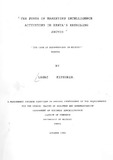| dc.description.abstract | Given the current strategic focus in business, a common place admonition
is to understand competitors strengths and weaknesses in the market, then to
position one's own offerings to take advantage of the weaknesses and avoid
head-to-head clashes against strengths (Aaker, 1988).
The study contained in this report, therefore sought to investigate the
state and extent of marketing intelligence activities in Kenya's retailing
sector, with particular reference to supermarkets in Nairobi.
In order to realize the objective of this study, a survey was carried
out. The primary data was collected through personal interviews with 31
supermarket executives at the City center and the Westlands areas of Nairobi.
The interviews were guided by a questionnaire - with undisguised open and
closed questions derived from the model of the marketing intelligence system
given in the literature review.
Once the data had been collected , it was analyzed with the help of
descriptive summary statistics ; proportions, percentages, means, frequency
distributions and tabulations. The study being investigative in nature.
The results of this study revealed a supermarket profile, with it's
building blocks centered around the absence of a marketing department in most
supermarkets, forcing their directors to informally set unwritten marketing
objectives and plans. Most supermarkets are pro-active in their promotional
campaigns, while being re-active in their fight against competition.
The supermarkets surveyed, confirmed the use of descriptive, speculative
and defensive marketing intelligence by most supermarket directors in making
marketing decisions, that touch mainly on all the variables of the marketing
mix. However, aggressive marketing intelligence was found to be used by the
large and City center based supermarkets.
To set up a marketing intelligence system, most supermarkets rely
heavily on.marketing intelligence from the market, competitive and the
economic trends. However, they rely on analyzing the physical evidence,
observing, personal contact and the media, as their main source of marketing
intelligence.
Most of the marketing intelligence activities among the supermarkets
surveyed, are done informally and without the use of data bases, while, a few
isolated cases of supermarkets with formally established marketing
intelligence departments were reported. It was established, nevertheless,
that each supermarket, has at least the equivalent of one full time employee
undertaking marketing intelligence activities, though usually assigned other
company duties.
All supermarkets contacted revealed an increase in the marketing
intelligence activities budgets, especially during the early 1990's,
indicating a growing concern by supermarkets to it's need. However, lack of
resources, was cited mostly as being the major limitation hindering marketing
intelligence activities.
In analyzing the marketing intelligence gathered, most supermarkets rely
on the activity capability of the intelligence gatherer. In turn, most
intelligence gatherers rely heavily on meetings to deliver marketing
intelligence to the key decision makers and employees of the whole
organization.
Most of the supermarkets studied use marketing intelligence in
estimating market changes. These changes may lead to the semi-annual or
annual review of marketing objectives and plans.
The findings from the study, however, led to the following conclusion,
that
i,
activities are a fact of life and that improvements in intelligence gathering
for businessmen and in particular marketers, marketing intelligence
from the marketing environment, mayor may not lead to improvement in the
organizational performance. Emphasis, nevertheless , should be on the ability
of the employees of the whole organization and key decision makers, with the
aid of the marketing intelligence gathered, to uncover or infer competitor
strategy and other competitive factors. To the extent that this is possible,
a supermarket may attain great competitive advantage.
The study, however, faced limitations. The large leading supermarket
chain in Nairobi among others did not respond to the survey and there was lack
of resources and time to undertake a more comprehensive study. | en |

